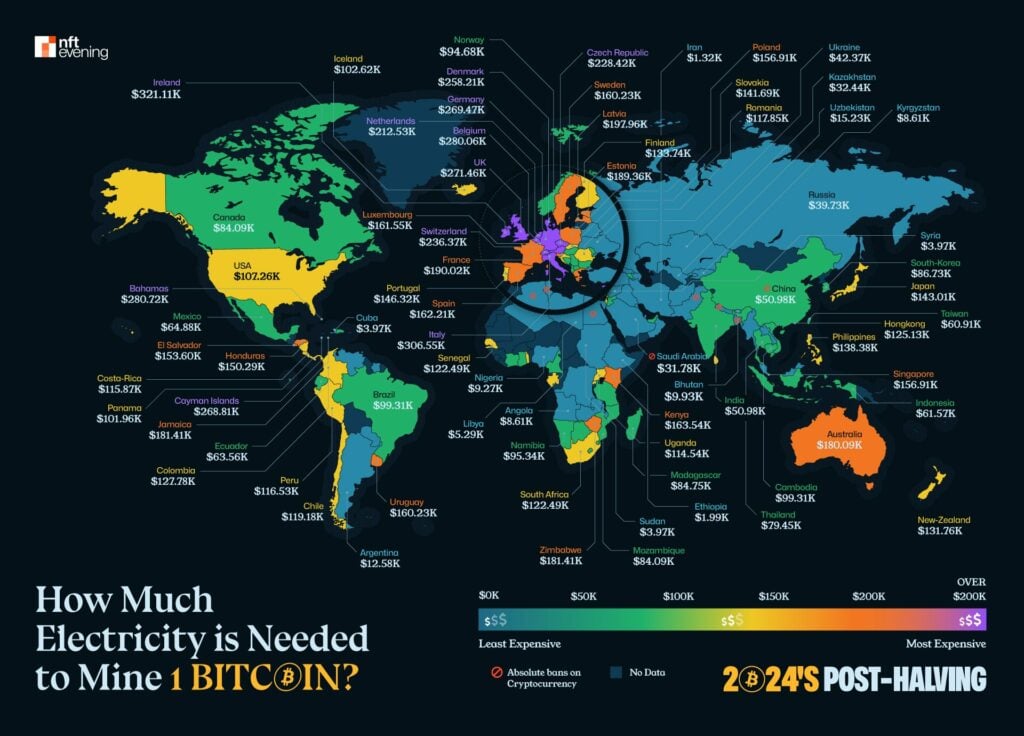Bitcoins Halving Upending Global Solo-mining Profitability

The cost of mining one Bitcoin drastically changed after April’s halving, while eight countries with affordable electricity have already banned BTC mining.
Mining Bitcoin (BTC) was once a cash cow for early individual adopters, but not since the halving earlier this year, according to a September study by NFT Evening.
People in Ireland, for example, have to spend around $321,112 to mine a single Bitcoin. In Iran, the same process would cost about $1,324. Due to energy costs, U.S. miners operated at a 50% loss when Bitcoin dropped to $57,909 last month. This paradigm played out despite America being one of the largest BTC mining hubs globally.
BTC was built upon a proof-of-work consensus model by its pseudonymous creator, Satoshi Nakamoto. This blockchain design means network participants must commit computing power to solve complex mathematical problems and earn block rewards.
The block rewards are denominated in Bitcoin, allowing new tokens to enter circulation until BTC’s fixed supply of 21 million is achieved.

Coincidentally, Bitcoin mining is highly profitable in countries where the cryptocurrency was banned. Over 20 Asian countries, including China, an anti-BTC nation, have energy pricing systems suitable for Bitcoin mining. Five African countries also offer cheaper power packages, making nations like Ethiopia, Sudan, and Libya a target country for Solo and institutional miners.
Meanwhile, high-energy tariffs have rocked some European countries and raised the BTC mining entry barrier. The NFT Evening report said mining one BTC in Germany or the U.K. could cost five times the asset’s spot value.
The halving, which happens every four years, changed the $2 billion Bitcoin mining business. Nakamoto designed the system to make it more difficult for new Bitcoin to enter circulation. Every four years, the rewards for mining each BTC block rewards are halved, and miners get fewer tokens for running energy-intensive computer rigs.
Per the report, the new mining era has encouraged participants to seek low-energy countries or risk legal reprimand in nations like China.
But even institutional miners were not spared from the change. In May, weeks after the halving, Bitcoin miner Stronghold explored selling its business as entities adjusted operations to stay afloat. Rival company Bitfarms reportedly made plans to acquire Stronghold and consolidate its mining capacity.
Crypto Firms Push Into US Banking
America’s cryptocurrency companies are scrambling to secure a foothold in the country’s traditional banking system, ... Read more
Ether Surges 16% Amid Speculation Of US ETF Approval
New York, USA – Ether, the second-largest cryptocurrency by market capitalization, experienced a significant surge of ... Read more
BlackRock And The Institutional Embrace Of Bitcoin
BlackRock’s strategic shift towards becoming the world’s largest Bitcoin fund marks a pivotal moment in the financia... Read more
Robinhood Faces Regulatory Scrutiny: SEC Threatens Lawsuit Over Crypto Business
Robinhood, the prominent retail brokerage platform, finds itself in the regulatory spotlight as the Securities and Excha... Read more
Ethereum Price Holds Five-year Range As Breakdown Risk Points To $950
The current Ethereum price is within a long-term five-year range and positioned below key volume levels, increasing the ... Read more
400 Million Coins Left: BlockDAGs $0.0005 Entry Price Is About To Vanish Forever
BlockDAG is entering its final presale hours at a fixed price of $0.0005, with only 400 million coins remaining before p... Read more

